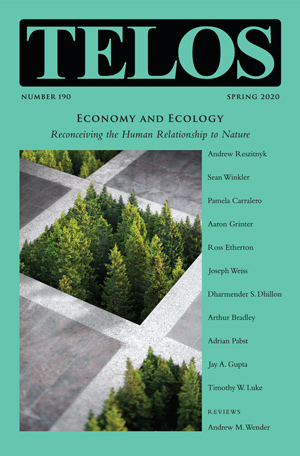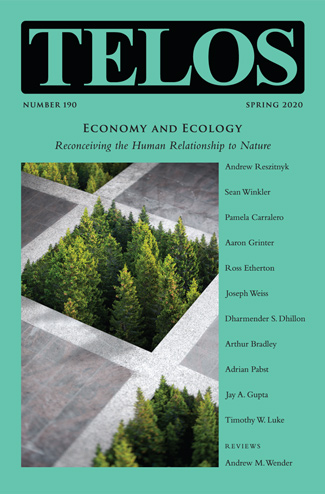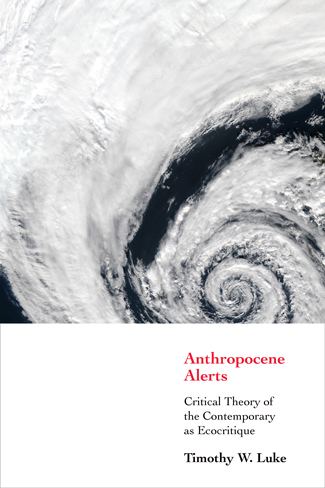By Telos Press · Monday, December 7, 2020 The new issue of the journal New Political Science features a review symposium on Timothy W. Luke's Anthropocene Alerts: Critical Theory of the Contemporary as Ecocritique, published by Telos Press Publishing. For one week only, save 30% on your purchase of Anthropocene Alerts by using the coupon code ALERTS30 during checkout in our online store.
Continue reading →
By Norbert Bolz · Thursday, September 17, 2020 Worse than the concrete fear of some life-threatening reality, such as in the past the Spanish flu or today COVID-19, is the anxiety nourished by the imagination of terror. This is the business of the modern prophets of the apocalypse, who usually show up in the guise of science. They lend support to the great religion-substitute of an infinite environmentalist worry, with which the Party of Prohibitions exploits the guilty conscience of an affluent society. Instead of “What can I hope for?”—a question for which one used to expect an answer from Christianity—they ask: “What must I fear?” This accords to the presumed wisdom of children who want to carry out a world tribunal to save the earth.
Continue reading →
By Pamela Carralero · Friday, June 12, 2020 Pamela Carralero’s “Scientific Modeling and the Environment: Toward the Establishment of Michel Serres’s Natural Contract” appears in Telos 190 (Spring 2020): Economy and Ecology: Reconceiving the Human Relationship to Nature. Read the full article at the Telos Online website, or purchase a print copy of the issue in our online store. Individual subscriptions to Telos are available in both print and online formats.
 In the sciences, the hypotheses driving the exploration of the natural world are often investigated via analogical transfer, meaning that the crux of scientific activity resides in the use and interpretation of models as tools that facilitate an accurate description of natural laws. The exact status of the model’s role and its lasting importance, however, remains a controversial topic among scientists and philosophers. For some, the model is a way of reaching a conclusive theorem or systematic statement; for others, including French philosopher Michel Serres, the model is a multifaceted space of translation that asks its interpreters to meditate on the inaccessible nature of what it makes accessible via ideogrammatic transcription. In the sciences, the hypotheses driving the exploration of the natural world are often investigated via analogical transfer, meaning that the crux of scientific activity resides in the use and interpretation of models as tools that facilitate an accurate description of natural laws. The exact status of the model’s role and its lasting importance, however, remains a controversial topic among scientists and philosophers. For some, the model is a way of reaching a conclusive theorem or systematic statement; for others, including French philosopher Michel Serres, the model is a multifaceted space of translation that asks its interpreters to meditate on the inaccessible nature of what it makes accessible via ideogrammatic transcription.
Placing Serres in conversation with Bruno Latour and Jacques Rancière, this article argues that Serres provides the tools to theorize models as mediums through which to acknowledge and interact with the environment as that which is innately inaccessible to human knowledge. This is a first step toward establishing what he calls a “natural contract,” a union of life-giving reciprocity between humans and nonhumans that offers new conceptualizations of knowledge and science as practices free from the totalizing codifications of human verdicts. More specifically, this article imagines models as gateways between the inaccessible and accessible, arguing their value as a setting for the construction and play of scientific interpretations. It concludes by examining the relationship between modern climate models and the inaccessible in order to propose a techno-scientific, intra-temporal mentality of uncertainty from which a natural contract can develop.
Continue reading →
By Aaron Grinter · Thursday, April 16, 2020 Aaron Grinter’s “Metaphors in Science: Lessons for Developing an Ecological Paradigm” appears in Telos 190 (Spring 2020): Economy and Ecology: Reconceiving the Human Relationship to Nature. Read the full article at the Telos Online website, or purchase a print copy of the issue in our online store. Individual subscriptions to Telos are available in both print and online formats.
 The scientific method seems familiar to most, but an important element of this practice is often overlooked: the metaphor. This article explores the role played by metaphors in the conception and experimentation of scientific hypotheses, and the extent to which the process of metaphorical consideration is founded in imagination and creativity. With positivistic and reductionist traditions coming to prominence within scientific disciplines, there is emerging a corresponding lack of imagination and increased dislocation from the natural processes being studied. Using the complex process logic involved in metaphorical understanding, the task will be to develop a new paradigm to break out of these stifling traditions, one that has the potential to consider the complex holistic interrelations of the biosphere. As the epoch of the Anthropocene becomes more inculcated in contemporary culture, there has never been a more important time to reassess our relationship to, and position within, the natural world. The scientific method seems familiar to most, but an important element of this practice is often overlooked: the metaphor. This article explores the role played by metaphors in the conception and experimentation of scientific hypotheses, and the extent to which the process of metaphorical consideration is founded in imagination and creativity. With positivistic and reductionist traditions coming to prominence within scientific disciplines, there is emerging a corresponding lack of imagination and increased dislocation from the natural processes being studied. Using the complex process logic involved in metaphorical understanding, the task will be to develop a new paradigm to break out of these stifling traditions, one that has the potential to consider the complex holistic interrelations of the biosphere. As the epoch of the Anthropocene becomes more inculcated in contemporary culture, there has never been a more important time to reassess our relationship to, and position within, the natural world.
Continue reading →
By David Pan · Monday, March 16, 2020 Telos 190 (Spring 2020): Economy and Ecology: Reconceiving the Human Relationship to Nature is now available for purchase in our store. Individual subscriptions to Telos are also available in both print and online formats.
 Our human relationship to nature defines our economic life. As Marx articulated in the 1844 manuscripts, labor involves an engagement with nature in order to fulfill human ends, the working up of nature as an “inorganic body.” Consequently, the world of work and that of the environment are really two aspects of our relationship to nature, and the shift in academic interest from economy to ecology as the burning issue of the day does not represent any real change in perspective. On a fundamental level, economy is ecology and vice versa. Thus, the issue of climate change is primarily one about the energy structure of our economy. If that structure before the Industrial Revolution boiled down to the way in which we were cutting down our forests, today the issue is how fossil fuels are leading to climate change. The other global natural disaster of our day, the coronavirus, has arisen as a consequence, first, of our treatment of wild animals as food and, second, of economic globalization, whose movements have established the pathways for the rapid spread of viruses. Our human relationship to nature defines our economic life. As Marx articulated in the 1844 manuscripts, labor involves an engagement with nature in order to fulfill human ends, the working up of nature as an “inorganic body.” Consequently, the world of work and that of the environment are really two aspects of our relationship to nature, and the shift in academic interest from economy to ecology as the burning issue of the day does not represent any real change in perspective. On a fundamental level, economy is ecology and vice versa. Thus, the issue of climate change is primarily one about the energy structure of our economy. If that structure before the Industrial Revolution boiled down to the way in which we were cutting down our forests, today the issue is how fossil fuels are leading to climate change. The other global natural disaster of our day, the coronavirus, has arisen as a consequence, first, of our treatment of wild animals as food and, second, of economic globalization, whose movements have established the pathways for the rapid spread of viruses.
Continue reading →
By Telos Press · Monday, December 9, 2019 New from Telos Press: Anthropocene Alerts: Critical Theory of the Contemporary as Ecocritique, by Timothy W. Luke. Order your copy in our online store, and save 20% on the list price by using the coupon code BOOKS20 during the checkout process.
 From the late 1970s, Timothy W. Luke has developed critical analyses of significant social, political, and cultural conflicts, with a particular focus on the entangled politics of culture, economy, and nature. Luke’s “ecocritiques,” many of which first appeared in the pages of Telos, advance a critical theory of the contemporary that takes aim at our ongoing ecological crisis, a period marked by rapid climate change, extensive biodiversity loss, and deep ecospheric damage. The essays collected here range across diverse topics, from the politics of the Anthropocene, Paolo Soleri’s urban design experiments, the Unabomber manifesto, the Trump administration’s attacks on environmental protections, and the informationalization of ecological change, to community agriculture projects, deep ecology, the symbolic politics of climate change treaties, Edward Abbey’s ecological writings, and the biopolitics of accelerationism and the Dark Enlightenment. Taken together, this collection documents crucial moments in Luke’s project of ecocritique as well as the commitment of Telos to environmental criticism, political theory, and policy analysis. From the late 1970s, Timothy W. Luke has developed critical analyses of significant social, political, and cultural conflicts, with a particular focus on the entangled politics of culture, economy, and nature. Luke’s “ecocritiques,” many of which first appeared in the pages of Telos, advance a critical theory of the contemporary that takes aim at our ongoing ecological crisis, a period marked by rapid climate change, extensive biodiversity loss, and deep ecospheric damage. The essays collected here range across diverse topics, from the politics of the Anthropocene, Paolo Soleri’s urban design experiments, the Unabomber manifesto, the Trump administration’s attacks on environmental protections, and the informationalization of ecological change, to community agriculture projects, deep ecology, the symbolic politics of climate change treaties, Edward Abbey’s ecological writings, and the biopolitics of accelerationism and the Dark Enlightenment. Taken together, this collection documents crucial moments in Luke’s project of ecocritique as well as the commitment of Telos to environmental criticism, political theory, and policy analysis.
Continue reading →
|
|










